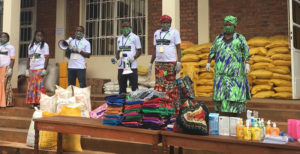Jewish World Watch (JWW) is proud to announce the disbursement of multiple critical grants to our on-the-ground partner organizations working on the frontlines of COVID-19 response in their atrocity-affected countries.
To continue JWW’s essential work supporting survivors of genocides and mass atrocities, JWW and our local partners need funding now more than ever. As can be seen from the grants described here, JWW is continuing our proven track record of supporting our innovative partners quickly and efficiently. Your support for JWW ensures that our amazing frontline partners can prepare their atrocity-affected communities against COVID-19.
JWW’s experience working with genocide- and mass atrocity-affected communities that have been hard hit with public health emergencies – from rampant sexual violence in the Democratic Republic of the Congo to the systematic bombing of hospitals in Syria – has taught us that community-led interventions are the most effective in dealing with health crises among war-beleaguered populations. Through your support, we are honored to be able to empower our partner organizations that operate on the local level. These groups’ established relationships in their communities ensure trust and maximum impact of every dollar we pass onto them.
JWW’s current emergency COVID-19 grants focus on supporting the dissemination of life-saving information about the deadly virus as well as the distribution of personal protective equipment (PPE) and emergency food supplies in the Democratic Republic of the Congo (DRC) and the Rohingya refugee camps in Cox’s Bazar, Bangladesh.
As soon as COVID-19 was declared a global health pandemic, Jewish World Watch reached out to our partner organizations in conflict-affected countries around the world to ask about their most pressing needs. As a result of these conversations, we quickly allowed our partners to pivot their existing funding to meet some of the unprecedented challenges posed by COVID-19. But we also realized that those pivots would not be sufficient and that they needed immediate COVID-specific emergency support.
[maxbutton id=”57″]
The window of opportunity to prevent the uninhibited spread of a COVID-19 outbreak in atrocity-affected, marginalized survivor communities is very narrow and shrinking quickly. Should COVID-19 break out as anticipated in these vulnerable communities, the impact would be catastrophic and containment a near-impossibility. To respond with urgency to the threat, Jewish World Watch quickly identified several effective interventions, and immediately began fundraising to meet the current and imminent pressing needs of our partners.
Each of the grants we have awarded is designed to directly meet the very clear concerns delineated by our partner organizations:
The Democratic Republic of the Congo
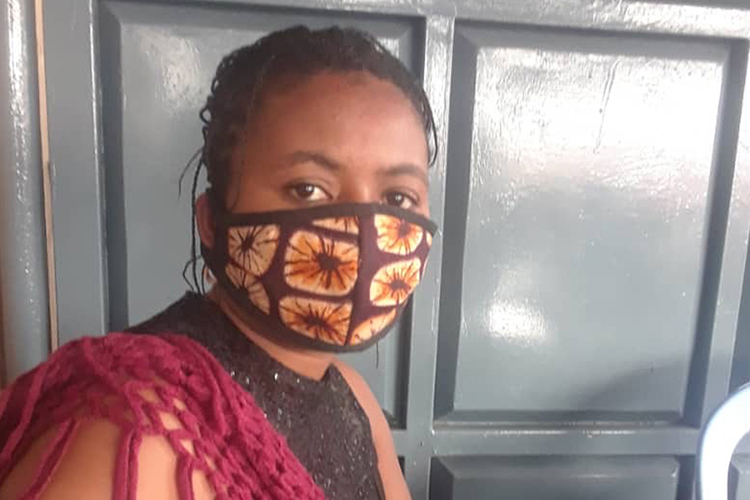
The number one COVID-related need among our partners is protection from the spread of the disease. The second concern – which is perhaps even more threatening – is extreme food insecurity. The latter is the result of the DRC’s countrywide shutdown instituted immediately on the heels of the country’s first reported cases.
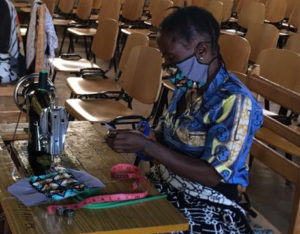 A seamstress sews protective masks in the Democratic Republic of the Congo
A seamstress sews protective masks in the Democratic Republic of the Congo
The Need for Protection
With borders closed as a result of the government’s COVID-19 response, personal protective equipment (PPE) – including face masks and sanitization materials – is nearly impossible to come by, leaving at-risk community members even more vulnerable to infection.
JWW’s Response
Jewish World Watch is supporting local seamstresses in the Congo to create masks from African fabrics and distribute them to vulnerable community members and frontline workers leading preparedness efforts in South Kivu. The seamstresses are members of a women’s cooperative, made up of survivors of gender-based violence – rape is commonly wielded as a weapon of war in the Congo. These seamstresses are women who have received past care and vocational skills training supported by JWW; as a result of that earlier project, these amazing survivors are not only self-supporting, they also are now playing a major part in producing PPE that is saving the lives of others.
The Need for Food Supplies
The isolation caused by a nationwide shutdown has created major food insecurity for impoverished war-affected civilians who must work in order to eat. With critical borders and marketplaces closed, businesses shut down and people ordered to shelter at home without any government assistance, the desperate need for food supplies for their families is mounting among Congolese civilians already grappling with ongoing mass atrocities.
JWW’s Response
Jewish World Watch is enabling our partner organization to provide emergency food packs to families it has identified as most vulnerable to starvation in the face of the countrywide shutdown. These families include orphaned children, people with HIV/AIDS and former child soldiers. Our partner is coupling the provision of a month’s worth of food with information dissemination on how to prevent COVID-19’s spread. As a trusted leader in the community, our partner is ideally positioned to secure the type of community buy-in necessary for preventing widespread infection.
[maxbutton id=”57″]
The Rohingya Camps in Bangladesh
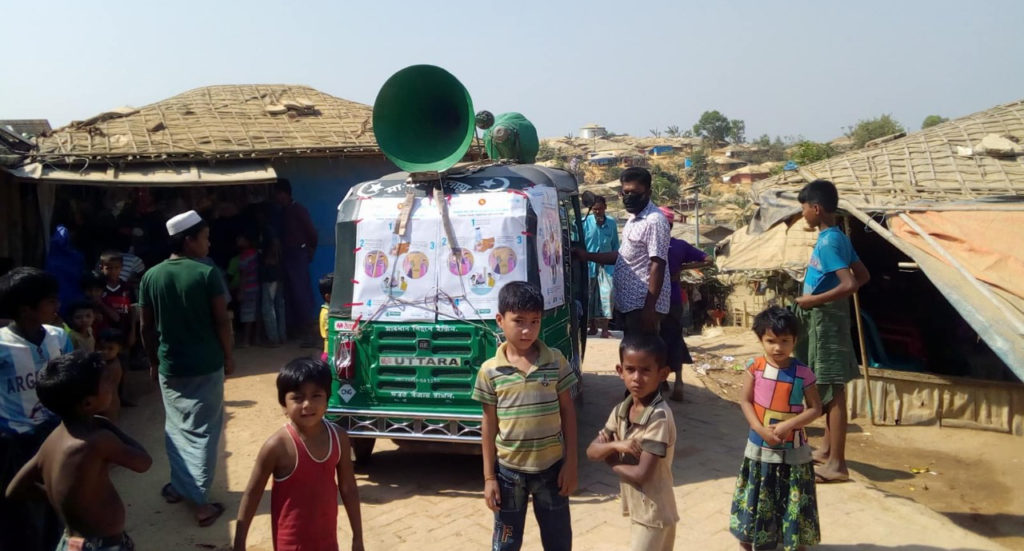
The Need for Information
Since late 2019, the Bangladeshi camp authority has severely restricted Internet and mobile phone usage inside the Rohingya refugee camps, home to 1 million Rohingya, the vast majority of whom fled genocide in neighboring Mynamar in late 2017. Bangladesh has proclaimed the telecommunications blackout a necessary security measure. Despite global calls to lift the ban, the Rohingya remain essentially isolated from the outside world. Now, the impact of the ban has become deadly, as the Rohingya are being deprived of critical information on COVID-19. The information blackout has resulted in the spread of disinformation and rumors about the spread and dangers of the disease, causing widespread panic. The Rohingya are cut off from critical information they need to protect themselves and their families at a time when accurate instruction about safety precautions is key to preventing the spread of the disease.
JWW’s Response
The government of Bangladesh remains unwilling to lift the telecommunications ban, making radio the best resource for disseminating life-saving information to as many Rohingya refugees in the camps as possible. Our partner runs the only radio tower inside the 34 Rohingya refugee camps in Cox’s Bazar and has already repurposed an existing JWW grant to provide original programming, in the Rohingya dialect, about COVID-19.
However, because not all of the refugees possess radios, they cannot all access this lifesaving information. With borders closed, large-scale sourcing and distribution of radios is impossible. In response, our partner’s innovative and fast-working solution is to mount loudspeaker systems to rickshaws, which can now reach all corners of the vast spread of 34 adjacent camps. These rickshaws are now broadcasting COVID-specific information around the clock. Through this project, our local partner, whom the Rohingya already know and trust, is effectively addressing the information gap created by the Internet ban, arming the Rohingya refugees with clear and contextually appropriate information.
The Need for Essential Supplies
The government of Bangladesh issued a camp-wide lockdown after the first reported COVID-19 case appeared in Cox’s Bazar city, about an hour’s drive from the Rohingya refugee camps. The lockdown included severe restrictions on access to the camps by humanitarian aid organizations, limited to only those organizations providing essential services. The result was a massive pullout by many of the aid organizations upon which the Rohingya have come to rely. Most critical, responding to food insecurity has emerged as a major concern among those few organizations still allowed to operate inside the camps during this precarious time.
JWW’s Response
We have enabled our longtime partner in the camps to provide a month’s worth of food supplies, as well as locally made soap and face masks, to Rohingya families it has identified as particularly vulnerable. The families targeted include female-led households, the elderly, and survivors of direct violence at the hands of the Myanmar military – including maiming and rape.
The Rohingya camps are three times as densely populated as Manhattan, making sheltering at home and social-distancing an impossible challenge. In the face of this, our partners are doing all they can to provide the most vulnerable refugees with the food they need to sustain themselves for an entire month, so they won’t have to leave their shelters in search of scarce food supplies.
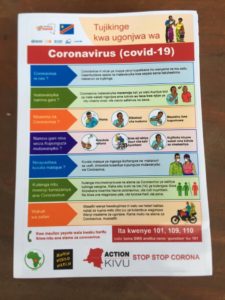 Informational fliers being distributed in the South Kivu region of the Democratic Republic of the Congo
Informational fliers being distributed in the South Kivu region of the Democratic Republic of the Congo
Our partners have reported to us that Jewish World Watch has been the first – and in many cases, the only – of their funders to provide COVID-specific funding to protect the communities they serve.
Jewish World Watch issued these rapid-response emergency grants within two weeks of receiving proposals from our partners. The photos shown here were taken by our partners in recent days, immediately upon receipt of funds. Through our shared vision, JWW and our partner organizations have been able to accomplish what many larger donors and humanitarian organizations have been unable to do.
[maxbutton id=”57″]


